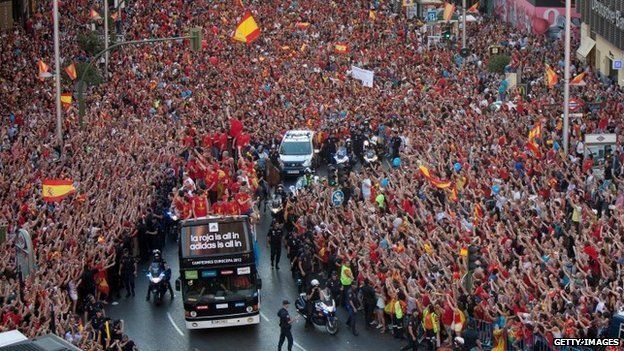Spain's year: Football glory, economic gloom
- Published

2012 has been a terrible year for Spain, a country so deeply beset by economic problems that it is barely possible to switch on the television or strike up a conversation without hearing the dreaded word "crisis".
Unemployment has hit record levels, banks are failing, increasingly angry protest marches have become commonplace, devastating cuts to public services are being universally imposed and a full-blown bail-out from the European Union remains a distinct possibility.
In the midst of all the doom and gloom, though, there has been one significant consolation for many people in this sports-mad nation: football.
In July, Spain made history by becoming the first international team in the history of the sport to win three consecutive major trophies: Euro 2008, World Cup 2010 and Euro 2012.
What is more, the team coached by the avuncular figure of Vicente Del Bosque did so in such a magnificent style - thrashing dangerous Italy 4-0 in the final - that they have been widely saluted as the greatest international team ever to have played the game.
With an emphasis on gifted ball-playing technicians such as Xabi Alonso, Xavi Hernandez, Andres Iniesta and David Silva, even seasoned football-watchers were left open-jawed by the fluidity and smooth control of Spain's unique short-passing style of play, setting the standards that many are now attempting to imitate.
Miguel Angel Aguirre, who has a strong understanding of public sentiment due to his job as the managing director of international PR agency Edelman in Madrid, confirms that the nation's mood was lifted by the exploits of the football team in the summer.
Top of the league
"Football is by far the most popular sport in Spain and there's a huge sense of belonging to 'La Roja', as we call the national team. The success of the team helped people forget the crisis for a few weeks," he says.
"The players were under a lot of pressure and there were great celebrations when they won. Thousands of people came together to watch the final on a giant screen in Paseo de la Castellana, one of the major avenues in Madrid, and the atmosphere was incredible."
And it is not just at international level that Spanish football excels.
The leading club competition, La Liga, is firmly established as one of the highest-quality domestic leagues in the world, with El Clasico - the clash between FC Barcelona and Real Madrid, featuring the best two players on the planet in the form of Argentine Lionel Messi and Portuguese Cristiano Ronaldo - capturing global attention.
However, even the silver lining of Spain's phenomenally successful football scene comes with a dark cloud attached, because a closer look reveals serious social divisions.
In the north-eastern province of Catalonia, the growing mood of Catalan nationalism meant that Spain's Euro 2012 victory was largely met with indifference.
"Most people here aren't particularly interested in the national team. It helps that the team contained a few players from Barcelona, but for Catalan people, the numbers one, two and three are Barca, Barca, Barca," says Tomas Obrado Cugat, a Catalan native and apartment block caretaker in Barcelona.
"FC Barcelona is effectively our national team. It's a team for the whole of Catalonia, not just the city of Barcelona."
This is nothing new - there is, of course, a long and occasionally bloody history of antipathy between the central government in Madrid and some of the regions, especially Catalonia and the Basque province.
'Funding Spain'
Football provided a public arena for that long-held antagonism at the end of May, when the Spanish cup final between the Catalans of Barcelona and the Basques of Athletic Bilbao - played in Madrid - was preceded by both sets of fans heartily whistling and jeering their way through the national anthem.
The level of regional nationalist sentiment has grown enormously since the onset of the financial crisis, with many Catalans in particular resenting the fact - as they perceive it - that the wealth generated by their region is used to subsidise the failings of the central government in Madrid.
The last few months have seen a rapid acceleration in the movement towards the creation of an independent Catalonia, with November's local elections giving a majority of votes to pro-independence parties who have proposed organising a referendum on the subject, despite warnings from Madrid that such a move would be illegal.
The state of tension has been somewhat alleviated by FC Barcelona's record-breaking start to the new season - they gained more points after 15 games than any team in La Liga history.
But although the much-adored team's form has provided some cheer, there is also an awareness that football can only do so much.
As Mr Obrado Cugat puts it: "Lots of people in this country have serious problems and worry about how they will eat tomorrow.
"For them, football isn't important; football can't feed you."
- Published11 September 2012
- Published2 July 2012
- Published13 July 2010
- Published10 December 2012
- Published29 November 2012
- Published26 July 2012
- Published2 August 2012